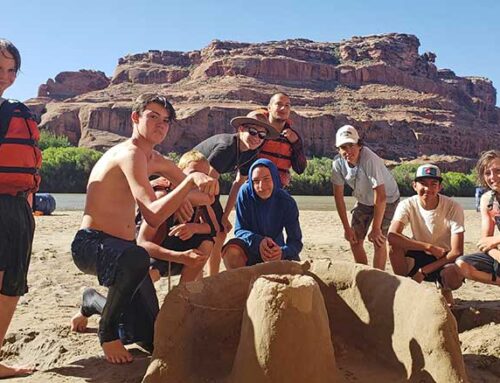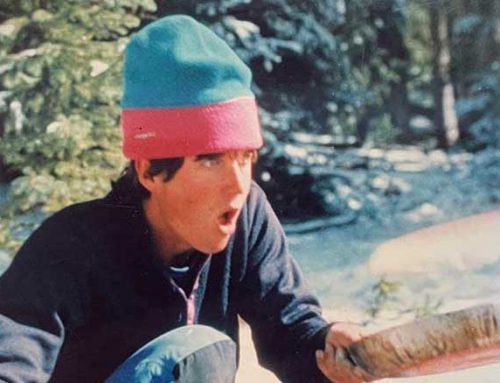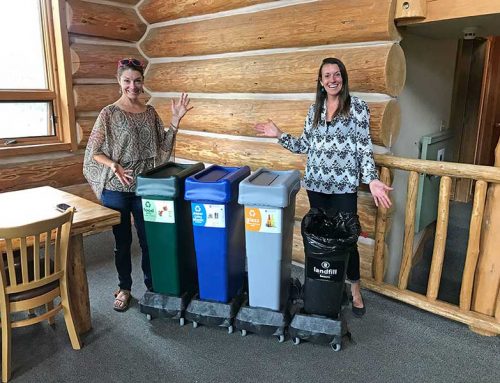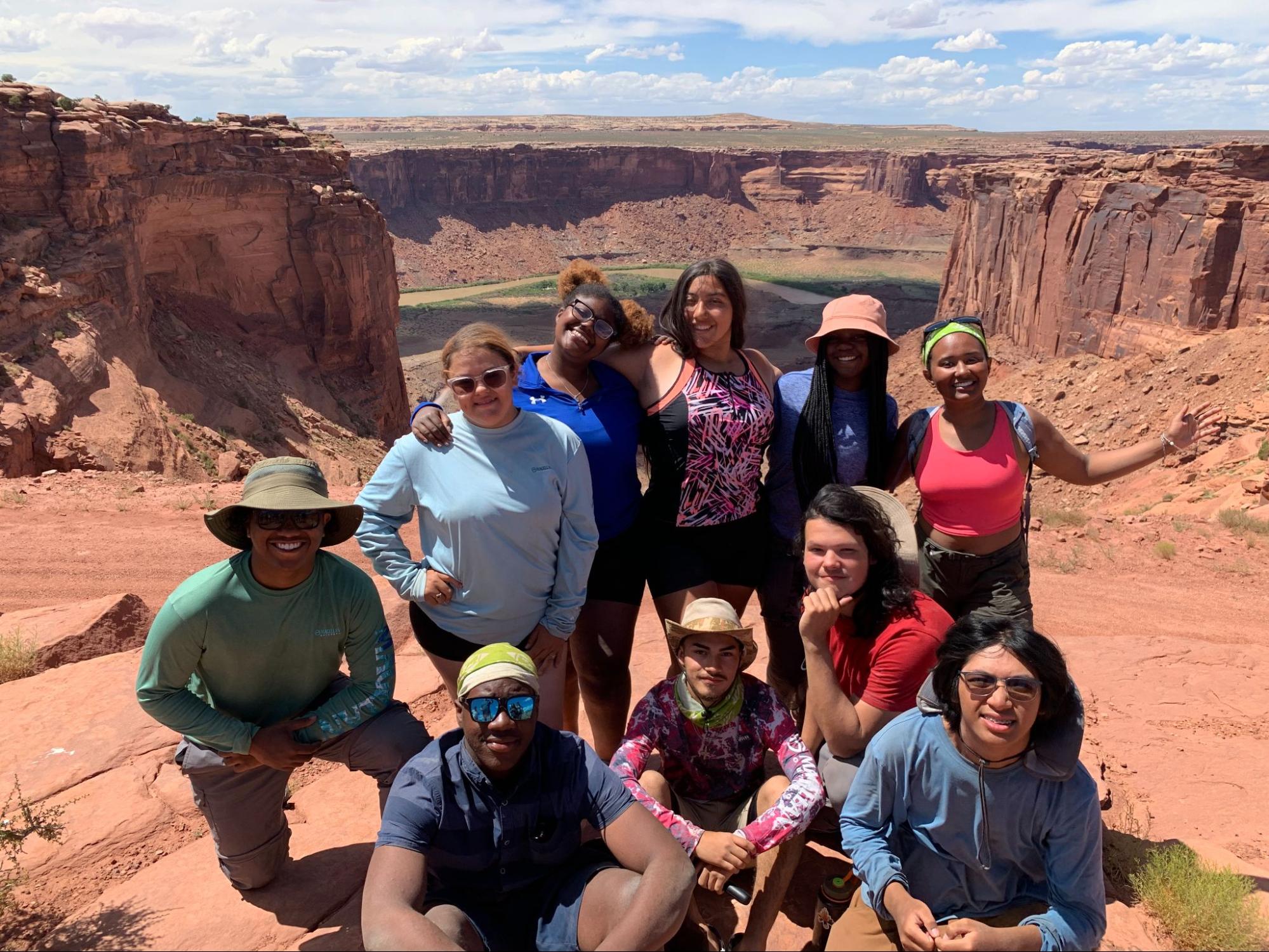
The Woods Project, from Houston, Texas, on an adventure on the Green River in Utah with BOEC.
“I think one of the most memorable moments for the students was when we visited Arches National Park and they got to climb around and explore nature’s miraculous architecture. The group, as a whole, really enjoyed exploration in both a physical sense, but also in the way they engaged their minds. We had a lot of deep conversations submerged in the deep canyon walls. This course was definitely a transformative experience for us all and I cannot wait to further partner with The Woods Project for more adventures in the future.” Summer BOEC Intern Skizzi Huffman shares, while discussing The Woods Project ten day adventure through the Labyrinth Canyon on the Green River in Utah.
The Woods Project (TWP) is a Houston-based organization that began when Steve Rosencranz led a group of 11 students from KIPP Houston High School on a ten-day trip to Yosemite National Park in 2006. Since that first trip, the program has grown to include 700 students annually participating in year-round events. These events include after-school programs at several different high schools in Houston, five or six weekend trips around Houston in the spring and fall, and a two-week long summer trip where they take Houston students to different national parks and forests around the country.
TWP partners with Houston high schools that serve high percentages of low-income students, who are most likely to benefit from the experience. Participants are from economically-disadvantaged households and range from 14 to 18 years of age. On average, 70% of participants are Latino, 20% are African-American, and the remainder are of mixed race or other ethnicity.
The trips led by TWP cover a variety of outdoor experiences from outdoor recreation to service projects. Utilizing trained volunteers and teachers as trip leaders allows for an extremely dynamic and efficient program that provides student participants with positive role models and exposes them to a larger perspective of the world. Trip leaders come from diverse backgrounds and experiences, including demographics similar to those of TWP participants.
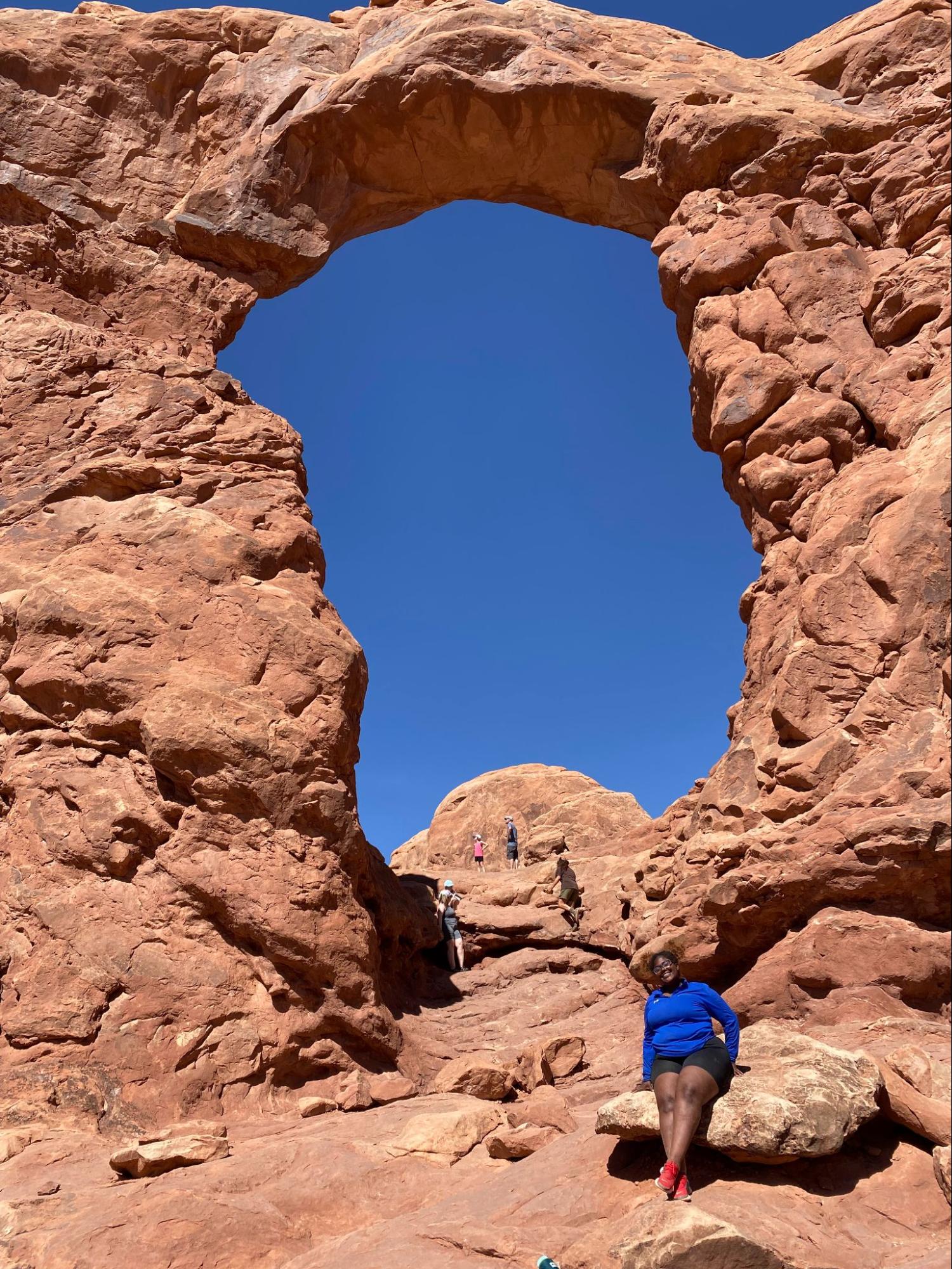
Rubi Marquez, The Woods Project and BOEC participant at Arches National Park.
The biggest challenges for TWP are recruiting students since local schools don’t have resources to help find and connect students to TWP, however they are actively working on creative solutions to change this. Another challenge is finding volunteers and leaders with the skills, time, and interest to do this impactful work.
In a conversation with Executive Director of The Woods Project, Natalie Hausman-Weiss, she discussed the future of the organization and starting the next strategic phase with the support of their Board of Directors. To continue to serve deserving Houston students, they are planning to grow, but not at the cost of compromising quality and integrity. Their model depends on availability of volunteer leaders for fall and spring, requiring specific leaders who have capability and training for backpacking and growth in part depends upon an appropriately trained number of volunteers.
Natalie was excited to share that TWP is making a real difference for inner city, historically marginalized students, from low income communities, in the greater Houston area. They focus on impact, attendance at school, family, and the community, growing more confidence and broader view of the world. Alumni José describes his experience this way,
“The Woods Project has given me a sense of motivation to seek a college education and strive for possibilities that have been harnessed in my imagination. After facing my fears by going down scary switchbacks at Yosemite Falls, hiking up a summit in Yellowstone, and paddling a kayak across waves traveling at five knots, I realized that I can overcome obstacles and seek endless possibilities. Meeting various park rangers from many locations, and realizing their closeness and passion for the environment, I now understand the possibilities that their careers entail. I had nothing to lose and everything to gain by exploring the outdoors. That is what makes The Woods Project incredible: they’ve sparked the idea of possibility – that I can achieve anything.”
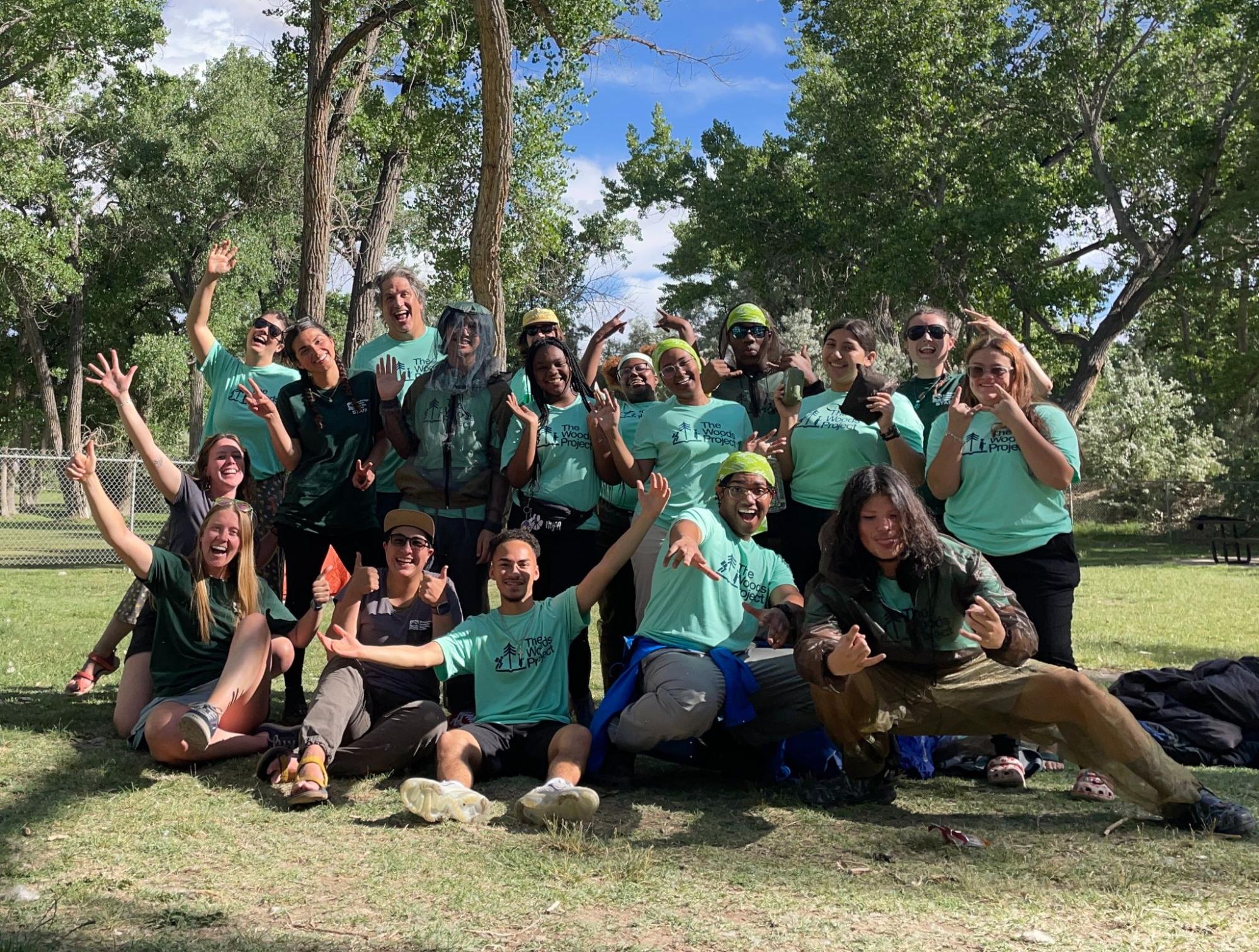
The Woods Project and BOEC guides.
As the mother of a son with a disability, Natalie involved her son in The Lakeshore Foundation, a year round program for individuals with disabilities. Her son found great role models through this foundation where they learned about adaptive skiing with BOEC. Since then, her son has gone skiing in Breckenridge multiple times with BOEC. Last year, at a conference, Natalie met Jillian Palacio, BOEC’s Training Manager, who told her about the BOEC Wilderness summer programs and this began a relationship that turned into the BOEC/TWP summer wilderness adventure.
The Woods Project “exists to improve the life trajectories of Houston high school students from historically marginalized communities, the majority of whom are people of color. Through wilderness immersion and exploration of public lands and other natural areas where people of color have been significantly underrepresented, students develop the tools they need to find their voices to work toward change.” On this BOEC course, another goal for the students was to promote independence by having “leaders of the day”. While on the river, the leaders of the day would make logistical decisions and motivate the other students to accomplish their goals for the day. Informally, additional goals were community building, leadership skills, outdoor education while enjoying the opportunity to be in a unique and magical place that not everyone experiences. The students that participated in this course were more experienced in the outdoors since they were all alumni, participating on a Woods Project trip previously.
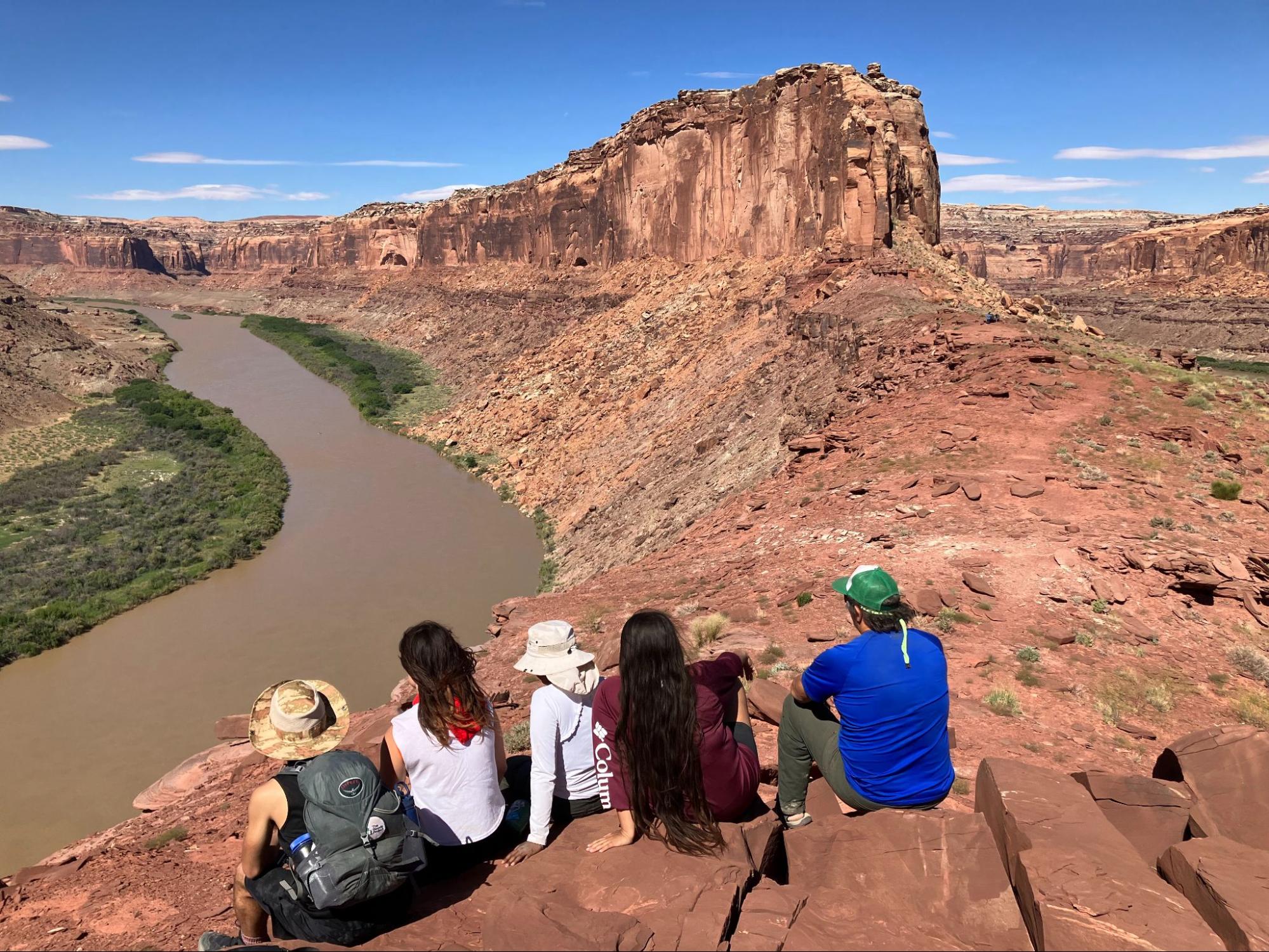
Overlooking the river on the Bowknot hike.
Natalie describes TWP’s experience working with the BOEC team as “really good.” They were impressed by BOEC’s willingness to meet them where we are at, as The Woods Project has been trying new things this year. BOEC was good at pivoting when challenges arose, and figured out how best to accommodate and fit The Woods Project goals for the program. There were hiccups with bugs and weather but teamwork between BOEC and TWP staff was key to figuring out how to overcome these challenges.
Skizzi, who worked with TWP as one of her first backcountry trips with BOEC, shares her story, “My experience with the Woods Project was very enjoyable. We spent 10 days canoeing and hiking through Labyrinth Canyon on the Green River in Utah. We learned about the land and the rock formations, how to function as a nomadic community and support one another and our personal needs, and we learned how to travel through wild places, where one must manually propel themselves through that environment, far away from technology and civilization.
Some memorable moments were the water wars we had on the river where the students would all surround one boat and try to splash the captive person (though they never did successfully get me on my kayak.) Dinnertime was also a nice time to check in and laugh or cry about the day’s adventures, while shoveling in good food. “We are living bougie out here,” the students all exclaimed on numerous occasions.
The most challenging part was definitely the blood deprived mosquitos. We had to wear bug suits at most of our campsites, cover our bodies in bug spray, and still our bodies got polka dotted head to toe with the little pests. I remember the one evening when we were eating enchiladas and in really good spirits because there were no bugs present. This was the night of the summer solstice, we had planned to have our talent show, but then out of nowhere the act begins…swarms of mosquitoes cloud the sky, the uninvited guests forced everyone to run into the bug tent, physically hurtling their bodies in, as the rest of us do a countdown and zip the zipper of the tent as fast as humanly possible. The circus had begun. The longest day of the year just got a whole lot longer.”
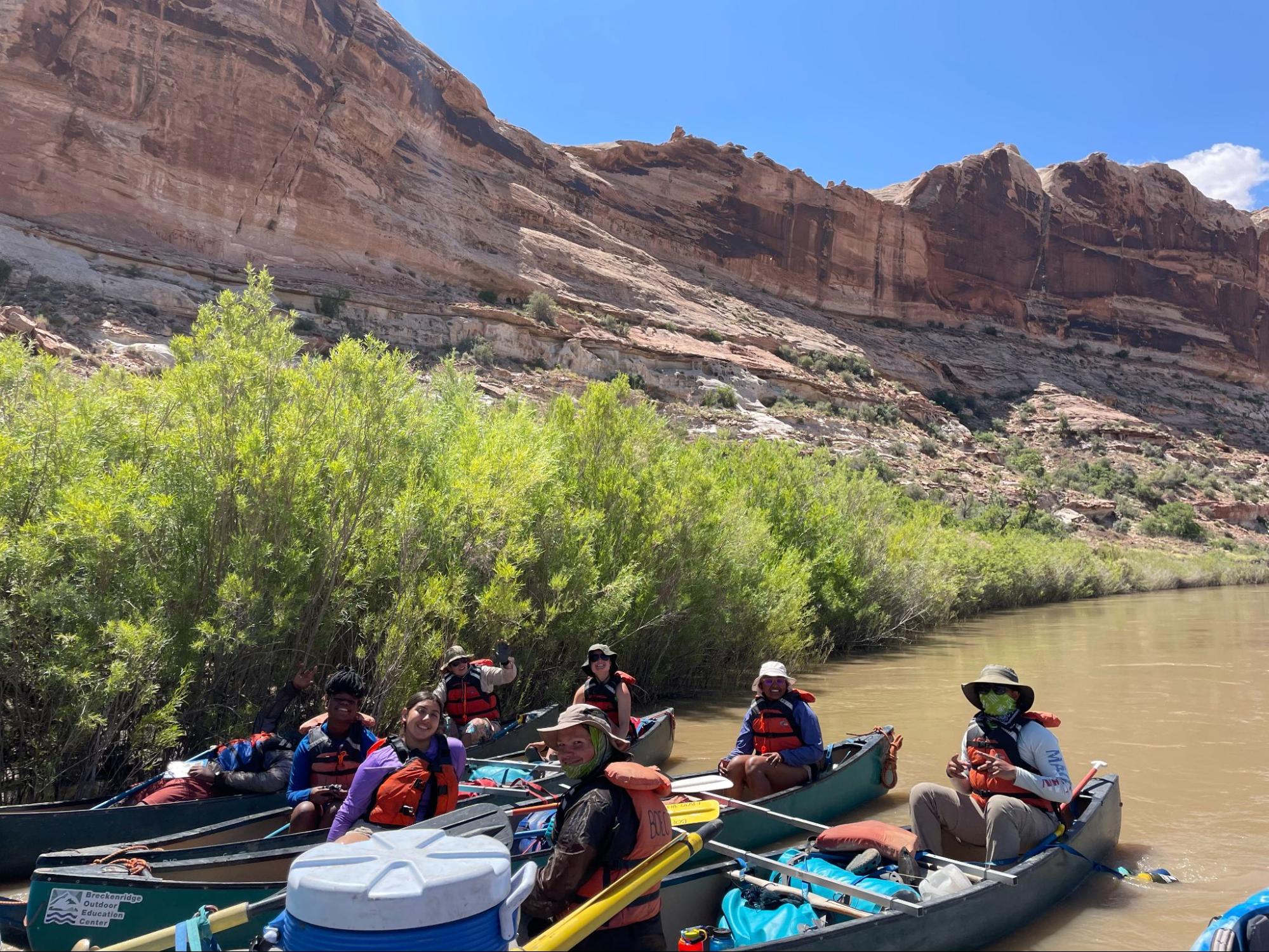
The Woods Project students out on the Green River.
The students participated in canoeing, which most of them had not done before and accomplished paddling 68 miles in total. They learned a lot quickly over the course of the first week including how to read a river, maneuver the boats and gain control, and how to work collectively as a team on a river trip. They went on a couple challenging hikes including up to the Bowknot, a steep, remote hike up a rock formation along the Green River with views of either side of the river. The main activities they participated in at each campsite were cooking, cleaning, and plumbing, teaching the students how to work to support their small community. The students were split into three groups that they stayed in through the trip. The groups would then be in charge of one of those responsibilities each day.
This course was led by seasoned BOEC Course Director Katie O’Donnell who shared the most rewarding part of the trip. She said, “I believe the paddling was the most rewarding for them. These students started the trip with a lot of difficulty navigating the canoe down the river. They found themselves along the riverbanks with a face full of tree branches several times. With that being said, I was thoroughly impressed with their progression throughout the week. One of my favorite days was when the students were racing along the river having water wars and were able to escape the fight with strong paddle strokes and quick navigation skills. I felt proud of their progressions throughout the week!”
The joy of the students was memorable in both Jillian Palacio, long-time BOEC Wilderness staff member and now Training Manager, and Katie’s recollection of events. Katie stated, “these students all love to sing! I was thoroughly impressed with the catalog of music they had stored in their brains and were able to sing the songs word for word and with so much passion.They definitely kept us entertained floating along the river.” She continued, “these students LOVED cooking, and they created amazing food with limited spices and backcountry cooking.” They also found the natural landscape to make excellent sleeping quarters due to the rock layers which made ideal bunk beds for camping.
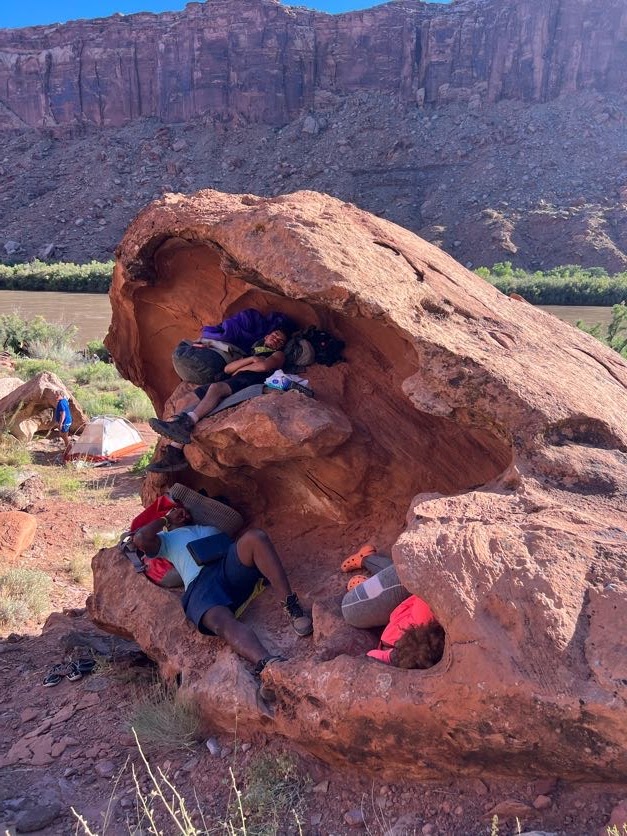
Natural bunk beds in the desert rocks.
Both Jillian and Katie thoroughly enjoyed the TWP students, describing the experience as, “the best crew I have been on a trip with, this was a great opportunity for the TWP participants and proved their emotional intelligence and self perspective to move through challenges in life” and “this was truly one of the best work related trips I’ve ever been a part of. I feel incredibly grateful to have had the opportunity to meet each of these students and provide an experience like the one we had.”
Jeremy Samuels, a volunteer with The Woods Project shares his experience,
“It was a wonderful trip. I loved how BOEC staff and The Woods Project staff worked together to provide a wonderful transformative experience for teens despite heat and mosquitos. The teens carried memories and experiences that will help them grow as individuals and as a team.”
Jeremy continues, “This group enjoyed the experience as a whole, the interaction between staff and students and each other was really the most impactful part of it. The team-building experience was particularly transformative and impactful. They appreciate the partnership both organizations have built to give this group of students, who wouldn’t have this chance to experience nature in this way, this opportunity. The desert environment was the perfect atmosphere for this alumni journey.”
This first trip with TWP set the bar high on both ends and BOEC staff are looking forward to what this relationship can turn into over time.

